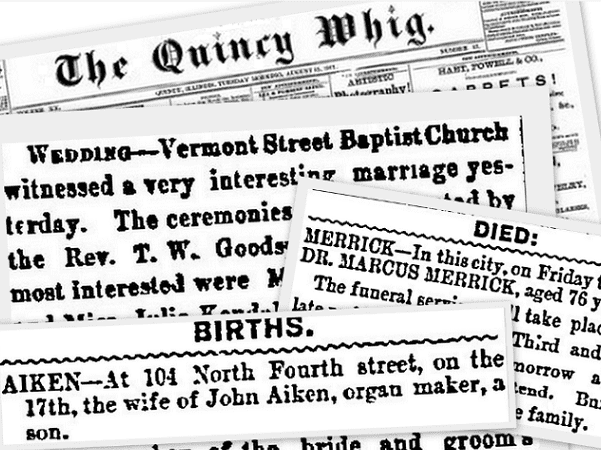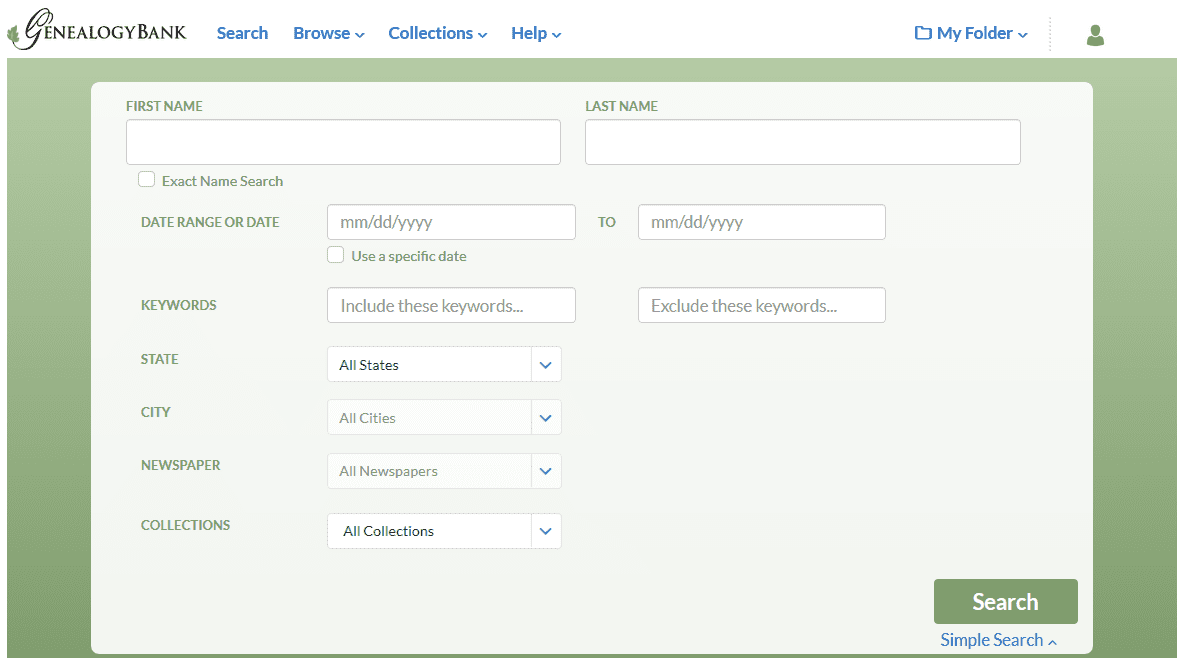Introduction: In this article, Gena Philibert-Ortega gives several tips to help you search old newspapers for stories about your ancestors. Gena is a genealogist and author of the book “From the Family Kitchen.”
How do you search historical newspaper archives for articles about your ancestors? That may seem like a simple question – but the way you search is important in making sure you get the results you seek. We all want to find our ancestors in historical newspapers, so conducting the best search possible is essential.
The following are just a few tips to help your newspaper search. The model I’ll be using is GenealogyBank, but these tips apply to any newspaper collection you’re searching.
Before You Start
Before you conduct your search, sit down and write out your ancestor’s full name. Now, take some time to write variations of that name. For example, if your ancestor is John Michael Smith, write out John Smith, J. Michael Smith, John M. Smith, J.M. Smith, and maybe, depending on the time period, Jno Smith.
Next, write down the various misspelling of that first and last name. It’s possible you’ve seen those in other records you’ve researched.
If you’re searching for a married female ancestor, write out the same list but include her husband’s name. For example, if her name is Trudy Jones but she’s married to John Michael Smith, she might be in a newspaper article as Mrs. John Smith. You’ll need his name variations as well as hers.
Begin Your Search
Think of searching as a process – not a one-time try. Use the name variations, keywords, and dates to craft multiple searches. Remember that the more information you add to a search, the fewer results you will receive. So, in some cases, you may not want to fill in each box on the search engine.
Let’s look at each component of the GenealogyBank search engine.
First, you can enter a given (First Name) and surname (Last Name).

Make sure to do some exact name searches, but don’t limit all your searches to exact name.
Next you can add a Date Range or a Specific Date to your search. This can be especially helpful when searching on a name that is quite common. Here’s where you can search on the years your ancestor was alive or on a specific date in their life. Remember that an obituary won’t happen the day the person died, so in some cases it’s best to do a date range.
The next line of boxes on the search engine are for Keywords. What’s a keyword? A keyword is really any word or phrase. But think in terms of words that will help your search be more specific. For example, let’s say that the surname you are researching is also the name of a county. In the Exclude These Keywords box you can use the word “county” or even the name of the state where that county is found (as long as it’s not the state your ancestor lived in).
So, what keywords should you use? Possibilities include an ancestor’s occupation, an event, an activity, the street name they lived on, or even the name of a relation you think should appear in an article with them. Think about what types of articles you expect to find and that might provide ideas for what keywords to use.
You can then include what State you want searched. The default is All States and you can leave that as is – but if you are searching for an ancestor with a common name, you may want to choose a specific state to search in order to limit the results you get.
If you’re searching in a particular state, you can narrow your search further to a specific City (or cities) in that state.
For example, if you select Vermont in the State box, then the City box will have a dropdown menu showing the cities in Vermont.
The default in the Newspaper search box is All Newspapers, since you don’t know how many newspapers published articles about your ancestor.
Finally, you can specify the GenealogyBank Collections you want searched. The default is All Collections and you may want to start by searching everything. Once you’ve searched, the results list allows you to click on the various collections and see that collection’s results. In fact, you can modify your search once you see your results list.
The Collections search allows you to make choices. That’s right; it doesn’t have to be the Newspaper Archives collection. Your choices include:
- Newspaper Archives
- Recent Obituaries
- S. Federal Census
- Social Security Death Index
- Historical Books
- Government Publications
Get Started Now
A little pre-planning with your search can help save you frustration later on. Take some time now to craft searches to use as you search for your ancestors in historical newspapers. Good luck with your family history research!

